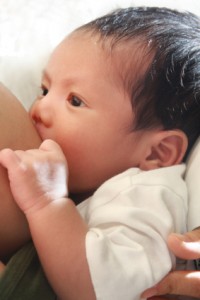
Overall, some 81 percent of all new mothers are opting to start their babies out on breast milk. This is a 15 percent increase on rates from the mid 1990’s in which only about 66 percent of all new moms started their babies out on the breast. Older mothers that hold a professional or managerial job seem to be leading the way in this new trend.
According to the latest data, 87 percent of mothers over the age of 30 chose to breastfeed while only 58 percent of teen moms chose breast over formula. Ninety percent of women in managerial or professional positions started with breast compared to 74 percent of women in routine or manual occupations.
What’s more, the data indicated that more women are breastfeeding for the recommended six months – 34 percent compared to just 21 percent in 1995 – but only one in 100 are actually adhering to the NHS recommendation that babies should receive breast milk exclusively during those six months. Many moms are supplementing with formula or choosing to initiate soft foods during this time. Campaigners say the fault lies with the NHS for not being realistic about the day-to-day responsibilities of today’s women.
“The percentage of mothers exclusively breastfeeding to six months, in line with guidance from World Health Organization and from UK Health Departments, is very small,” Heather Tricky, research manager for the National Childbirth Trust told Daily Mail. “This suggests that this high-level policy goal is not engaging with the reality of women’s experiences of feeding in the UK.”
While, in my opinion, the recommendation should not be changed because it is just that, a recommendation, I did feel that Tricky made some valid points in how breastfeeding rates can be further improved.
“We are concerned that more attention needs to be given to real-life circumstances, concerns and perceived barriers that women experience, that limit opportunities to initiate breastfeeding and to continue for several months. The vast majority of UK mothers introduce formula milk at some point,” Trickey said. “We are concerned that a high proportion of mothers stop before they planned to in the early days and weeks. This suggests many women are still not getting all the support they need during this critical adjustment period. Mothers who plan to breastfeed need access to skilled, knowledgeable, one-to-one support.”
In contrast to Trickey’s standpoint, Louise Silverton, director for midwifery at the Royal College of Midwives, believes the fault lies within society itself. She also feels there needs to be more focus on improving breastfeeding rates among groups in which choosing to breastfeed is less common, like teen moms and moms with lower incomes.
“There is still room for improvement among groups with traditionally lower breastfeeding rates and those who tend to breastfeed for shorter durations,” Silverton told Daily Mail. “Furthermore, there needs to be a sea of change in public attitudes towards breastfeeding in public places and more needs to be done to increase the visibility of breastfeeding and its acceptability in public.”
Related Articles:
- Swaddling Baby Too Tight May Lead to Hip Dysplasia
- Breastfeeding May Help Reduce Risks of Bite Problems Later in Life
- Dietary Guidelines for Canadian Infants Changes Dramatically to Increase Iron Levels






